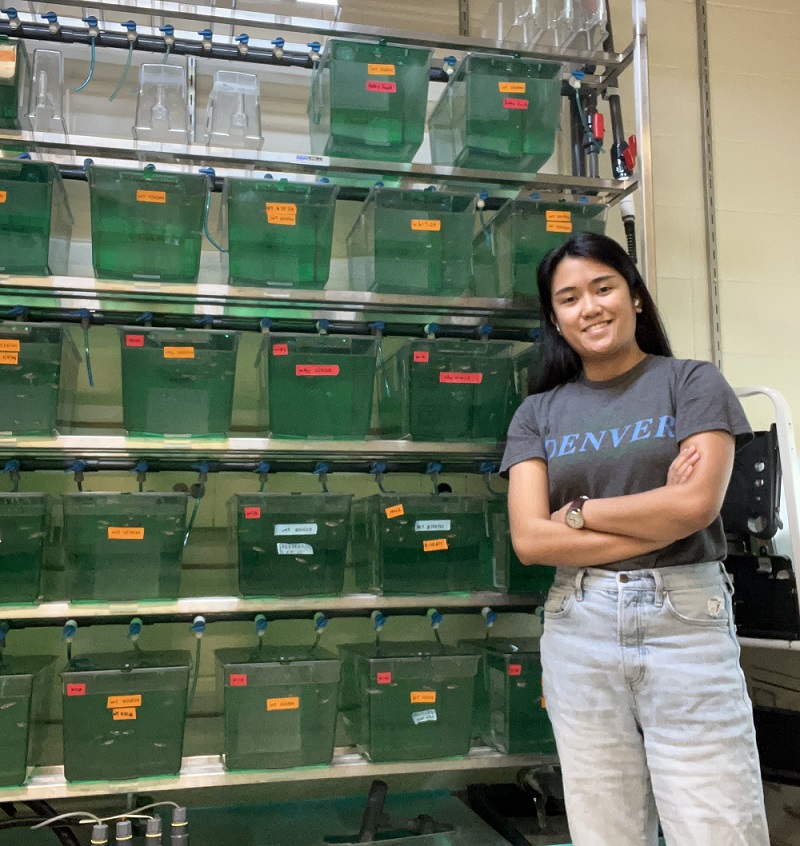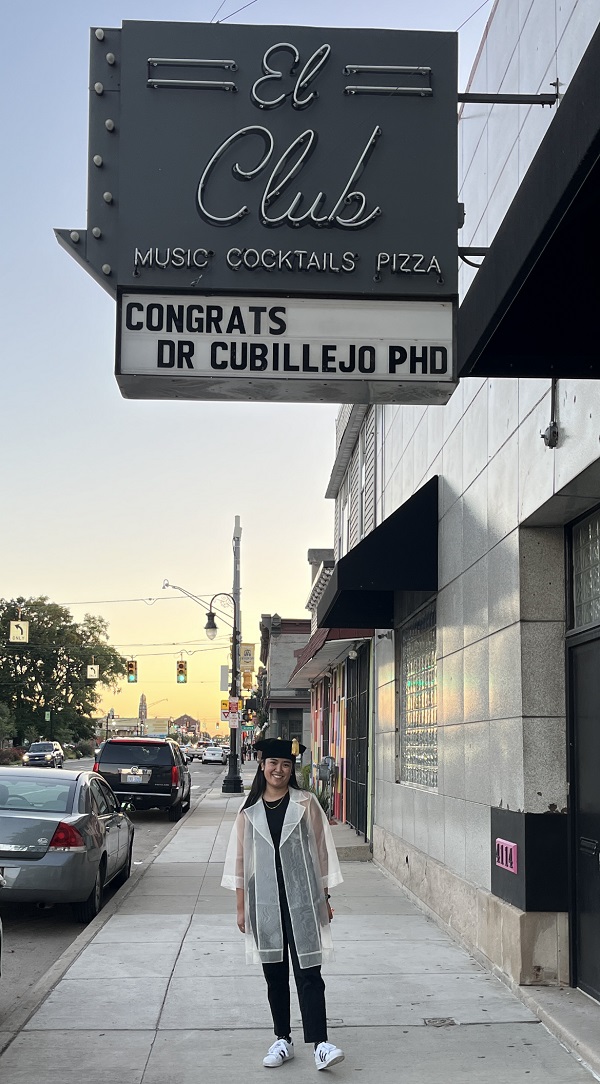Wayne State University School of Medicine graduate student Isabella Cubillejo, Ph.D., successfully defended her doctoral dissertation, “Zebrafish Gut Microbiome Structure and Swim Behavior After Vibrio cholerae Colonization” on Aug. 12 in the Margherio Family Conference Center. She started working in industry last month as an associate medical writer at MMS Holdings Inc., but not before marking her success with a celebration she dubbed “Ph.D.-palooza.”

Cubillejo, mentored by Professor of Biochemistry, Microbiology and Immunology Jeff Withey, Ph.D., joined the School of Medicine as a doctoral student in 2019. She also attended WSU for her undergraduate studies in Biology.
Question: Can you explain your dissertation in lay terms?
Answer: Vibrio cholerae causes cholera, a severe diarrheal disease that affects millions in impoverished countries. Without rehydration, the voluminous fluid loss can result in a 50% mortality rate. Pandemic strains of V. cholerae can be divided into two biotypes: classical and El Tor. El Tor, the currently dominant biotype, can persist in its host for an extended period of time. Zebrafish adults and larvae can be infected with cholera via immersion and they maintain a complex gut microbiome throughout infection. We characterized the zebrafish gut microbiome structure during El Tor infection. We also looked at how V. cholerae colonization affected the gut-brain axis involved in larval zebrafish behavior. We found that the adult zebrafish gut microbiome was significantly more diverse after an El Tor infection, and larval zebrafish exhibited a dampened behavioral response to an auditory stimulus. Further studies can provide answers as to what happens with interactions between cholera and its hosts in the natural environment.
Q: How do you feel to have successfully defended and when will you officially receive your doctorate?
A: The day itself went by very fast. It felt like I woke up, got on stage, said some words, and got a handshake from Jeff as he called me Dr. Cubillejo. It took a couple of hours to set in, but it’s been the biggest relief I’ve ever felt, and it made everything worth it. It’s the most rewarding feeling because, outside of academia, not many people know about all of the work that goes into research, writing and defending. Some former graduate students told me it felt underwhelming. Don’t listen to them. It’s been almost two months now and I’m still so happy. The actual, physical degree will come in December.

Q: How did you celebrate?
A: I honestly went all out. I rented El Club (in Detroit) and hired a deejay for a big party I called Ph.D.-palooza. I decorated the place with balloons and fish stuff, and they had my name on the marquee outside. My brother is a video editor in Los Angeles and I had him make a cool montage of some of my graphs and general zebrafish videos to play onstage behind the deejay. I’d been planning this huge, unique party my whole time in graduate school, right down to the exact playlist, so it was so much fun when it finally happened. I’m also pretty sure no one has ever thrown a Ph.D. party quite like it.
Q: What about the area of research you were in is interesting to you and why?
A: I’d always worked with bacteria and fungi but never with an animal model. Prior to working in Jeff’s lab, I had never even heard of zebrafish. One of the first journal clubs I went to was given by his former student, Paul Breen. I heard the whole story about cholera and zebrafish interactions for the first time and was instantly interested because I’d never heard anything like it. I learned that zebrafish are a newer animal model, and that Jeff’s lab established them as a cholera model. During my rotation in the lab I got to hear more about the rationale, and the experiments and dissections were all things I had similar lab experience with. It was a clear choice joining the lab. Plus, I just think fish are cool, although I’m biased.
Q: What advice would you give to someone defending?
A: It’s hard to say what will universally work, because we all have our own rituals and routines. I would say that you’ll be surprised how little preparation time you’ll have on the day of, so have everything squared away the day before, or else you’ll feel rushed. Keep in mind that when you defend in person you will naturally rush a little bit compared to practicing alone at home, so keep that timing in mind. And have friends or family in the audience take pictures! I wish I had more taken during my defense.
Q: What advice would you give to students just starting their doctoral studies?
A: Start writing as soon as you can. I followed that advice from older graduate students, and it saved me a lot of time. Time will pass quicker than you think, and getting a head start will save you from having to dig through your lab notebook to find the details later. You will save time as you wrap up if you’ve already written the intro and methods.
Q: Other than defense day, what is your favorite memory or significant event of your time here at Wayne State?
A: Jeff allowed me to go to two international conferences. I went to one in Manila, The Philippines, and one in Okinawa, Japan. I’d been to both countries, so I was so excited to go back. Being able to present my research to the world’s leading cholera experts was incredibly intimidating but rewarding. In The Philippines I got to visit some family, and go out to dinners with all of the principal investigators and tell them what foods to try and places to go. I don’t think many grad students get to have that exact experience. In Japan, I gave what was possibly my best oral presentation, and I explored Tokyo and Kyoto afterward on my first solo trip. I will miss conferences. I hope I get to go on some again in the future.